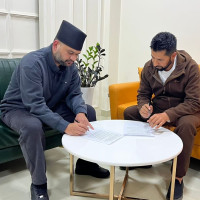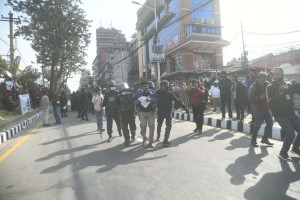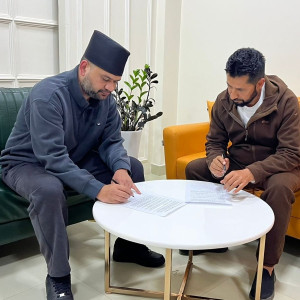Editorial
Equal but unequal
Prez Bhandari, Speaker Magar should clearly state support for women’s citizenship rights
On Sunday, House Speaker Onsari Gharti Magar expressed regret that laws were incomplete in unequivocally granting women the right to pass on citizenship to their children. She said that the new constitution prohibits any form of discrimination on the basis of gender.
“We fought to ensure equal rights for Nepali fathers and mothers to pass on citizenship to their children in the constitution, which clearly states that there shall be no gender discrimination on the basis of descent,” she said. The Speaker added that the new citizenship law drafted on the basis of the constitution would address the issue of the right to equal citizenship. She is only half right.
Article 11.2 (b) of the constitution states that “a person whose father or mother was a citizen of Nepal at his or her birth,” is qualified for Nepali citizenship. But the subsequent clause supersedes the initial clause on equal citizenship.
Aritcle 11.7 states that “Notwithstanding anything contained elsewhere in this Article, in the case of a person born from a woman who is a citizen of Nepal and married to a foreign citizen, the person may acquire the naturalised citizenship of Nepal in accordance with the Federal law if he or she has permanently resided in Nepal and has not acquired the citizenship of a foreign country. Provided that if such person’s mother and father both are citizens of Nepal at the time of acquisition of citizenship, such person born in Nepal may acquire the citizenship of Nepal by descent.”
The existing constitutional provision makes it difficult for a divorced Nepali woman to pass on citizenship to her child. It makes it mandatory for a Nepali mother to either identify her husband or prove that the father of the child is unknown.
The new constitution also makes it difficult for the foreign spouse of a Nepali woman to obtain citizenship. Earlier, the foreign spouse of a Nepali woman could obtain naturalised citizenship after he had remained in the country for 15 years. However, the new constitution is silent on when the foreign spouse of a Nepali woman will be eligible to apply for Nepali citizenship. Currently, the foreign spouse of a Nepali man can however get Nepali citizenship soon after marriage.
The argument offered by the Speaker is therefore disingenuous. She has conveniently overlooked the superseding clauses that deny women the right to pass on citizenship on a par with men. Her second argument that a new citizenship law would address the inequality clause is also frivolous. Any law inconsistent with the constitution will be ipso facto null and void.
The 2007 interim constitution had a provision for either the mother or the father to pass on citizenship. Yet, relevant district offices refused to provide citizenship through the mother.
The issue here is of the deeply entrenched patriarchal mindset of our male-dominated political and bureaucratic class. Unfortunately, people like Speaker Gharti and President Bidhya Devi Bhandari, who should ideally be champions of women’s rights, have somehow become coopted into the constitutional framework defined by political patriarchy. It is time female leaders took a firm stand and did right by the thousands of their sisters who suffer unimaginable consequences as result of being deprived of the right to pass down their identity to their children.




 12.99°C Kathmandu
12.99°C Kathmandu












%20(1).jpg&w=300&height=200)

